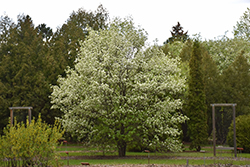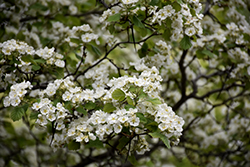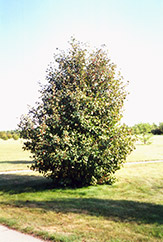It's all about ...
plants

Height: 20 feet
Spread: 20 feet
Sunlight:
![]()
Hardiness Zone: 3b
Other Names: Crataegus submollis
Description:
A attractive small tree with showy fruit and flowers and fuzzy leaves; this is the variety that produces tasty fruit that is cherry-like in appearance; a tough North American native that is excellent as a windbreak and in hedgerow plantings
Ornamental Features
Arnold Hawthorn is blanketed in stunning clusters of white cup-shaped flowers with chartreuse eyes held atop the branches in mid spring. The fruits are showy red pomes carried in abundance from late summer to early fall. The fruit can be messy if allowed to drop on the lawn or walkways, and may require occasional clean-up. It has dark green deciduous foliage. The serrated round leaves turn an outstanding yellow in the fall.
This plant is primarily grown as an ornamental, but it's also valued for its edible qualities. The large round sweet fruit is most often used in the following ways:
- Fresh Eating
- Cooking
- Baking
- Preserves
- Drying
Landscape Attributes
Arnold Hawthorn is a multi-stemmed deciduous tree with a more or less rounded form. Its average texture blends into the landscape, but can be balanced by one or two finer or coarser trees or shrubs for an effective composition.
This is a relatively low maintenance tree, and is best pruned in late winter once the threat of extreme cold has passed. Gardeners should be aware of the following characteristic(s) that may warrant special consideration;
- Disease
- Spiny
Arnold Hawthorn is recommended for the following landscape applications;
- Accent
- Hedges/Screening
- Windbreaks and Shelterbelts
- Naturalizing And Woodland Gardens
Planting & Growing
Arnold Hawthorn will grow to be about 20 feet tall at maturity, with a spread of 20 feet. It has a low canopy with a typical clearance of 3 feet from the ground, and is suitable for planting under power lines. It grows at a slow rate, and under ideal conditions can be expected to live for 40 years or more. This is a self-pollinating variety, so it doesn't require a second plant nearby to set fruit.
This tree should only be grown in full sunlight. It prefers to grow in average to moist conditions, and shouldn't be allowed to dry out. It is not particular as to soil type or pH, and is able to handle environmental salt. It is somewhat tolerant of urban pollution. This species is native to parts of North America.
This plant is not reliably hardy in our region, and certain restrictions may apply; contact the store for more information.


